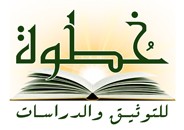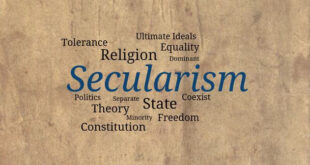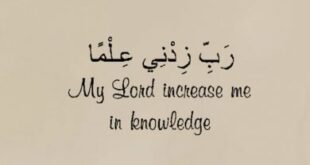Islamization of Knowledge
By: Mrs. Mohga Mashhour*
Any civilization depends on a religious belief or a philosophy. The distinctive feature of each civilization is its theoretical and value-based frame which is rooted through different sciences and theories. Since the nineteenth century till nowadays, European civilization has been worldwide dominating by spreading its capitalist materialism and individualism. All people around the world, willingly or unwillingly, consciously or unconsciously, are adopting the Western civilization paradigm as a lifestyle and a cognitive vision. Consequently, its concepts, scientific methodologies and theories spread worldwide, and sciences and approaches blindly follow Western standards. This one-sided cognitive paradigm centralized the Western view on both the scientific and cognitive levels. On the other hand, Muslims were not an authentic partner in establishing sciences and setting their methodologies, although our civilization was a significant reference in creating these sciences.
Muslims preceded others in establishing a religious-based civilization. Our history teaches us how religious-based knowledge is generous and humane. In fact, a cognitive activity based on a faith vision is essential to establish a value-based, strong and balanced civilization. But the modern tendency to imitate or import Western science does not establish a civilization or even rebuild it. In the best cases, it establishes an inferior world revolving in the orbit of other civilization. May be one can progress on the materialistic level but on the compass of civilization it doesn’t have its own principles and view. This does not mean that we intend to present the West as an absolute evil. In fact, it is to assert the significance of the independent religious identity and the attempts to rediscover its creative abilities in continuing its course towards civilization.
Lately Muslims realize how big is the crisis which expels them from the race track of dominant civilizations. Thinkers differ in determining the reason behind this backwardness. But we can say that the main reason behind this crisis is the failure in applying the law of renewal on the intellectual, materialistic, economic and social levels. In addition, relying on the status quo leads necessarily to backwardness and consequently, they are not counted in the historical movement.
Realizing this dilemma, Muslims began new intellectual renewal movements in the Islamic and Arab world. These movements can be traced through the following stages.
The first stage is marked by the so-called Renaissance thought, which was established in the second half of the nineteenth (19th) century and extended to the first decades of the twentieth (20th) century. Taha Al-‘Alwani1 called it the stage of culture shock and fascination with the West. The discourse at this stage aims to emphasize that Islam does not contradict science or civilization and that it is valid for all times and places. This call aims to achieve a kind of balance to face this dominant civilization and awaken the faculties of resistance between Muslims. Among the most prominent figures of this stage are ‘Abd Ar-Rahman Al-Kawakibi, Rifa’a At-Tahtawi, Khair Ad-Din At-Tunisi, Muhammad ‘Abdo, Rashid Reda, Jamal Ad-Din Al-Afghani and others.
The Second stage began after the fall of the Ottoman Empire in the first half of the twentieth (20th) century. It marks the overcoming of the fascination stage and the confrontation against western ideas. This stage was full of comparisons, approaches, and attempts to find common ground between Islam and Western culture. Among the most prominent figures of this stage are Malik ibn Nabi, whose writings focus on the dilemmas of civilization, ‘Ali Shari’ati, Muhammad Baqir As-Sadr, who succeeded in presenting an alternative Islamic methodology, and others.
The third stage dates back to the beginning of the eighties of the last century. In this stage, Islamic thought was influenced by the Islamic awakening and the effective role of the renewal discourse which emphasizes the importance of Islamic thought, knowledge, and comprehensive vision. Among the most prominent figures of this stage are Isma’il Al-Farouqi, Muhammad ‘Emara, Tariq Al-Bishri, Taha Jaber Al-‘Alwani, Hassan At-Turabi, Muhammad Mahdi Shams Ad-Din and others. This stage witnessed the formation of a movement which believes that the Islamic project did not give the intellectual dimension the attention it deserves, and this was one of the reasons behind its failure. Thus, this movement seeks out all the ways to find the Islamic cognitive basis to restore cultural awareness. This movement was represented through several schools. These schools adopted different terms to express their mission such as Islamization of knowledge, knowledge Islamization, the foundation of social sciences from an Islamic perspective and other terms.
Comprehensive Islamic Vision or the Cornerstone Necessary for Establishing the Approach
First we must note that the awareness of the distinction of the Islamic comprehensive vision on which the project of Islamization of knowledge is based appeared first before the establishment of this school. The introduction of this Islamic cognitive paradigm relied on the intellectual contributions of a group of thinkers at the top of which is Mahmoud Shaker, who introduced the concept of the “pre-approach”. This concept asserts the significance of the issues related to human self, language, belief and the comprehensive vision towards the universe, human life, and culture. These issues are factors that affect the researcher in the field of social and humanitarian sciences. They shape his vision and guide his reflection, analysis and thinking, which inevitably affect the result of his analysis, way of understanding and style of explanation.
Shaker said: The main rule in Descartes’ approach calls the researcher to get rid of all his pre-knowledge and start his research empty-minded. In fact, this is something beyond human ability. Suppose that he can empty his mind completely from what was said, and he can root out his entire pre-knowledge, can he also root out himself from the power of “language”…? Can he completely root up himself from the authority of “culture”…? Can he completely root up himself from his deep “desires”?2
Indeed, knowledge comes from culture that secretly dissolves in the heart of every human being. It is not only a reason-based knowledge, but it is the knowledge that one can prove its authenticity through both his reason and heart. Then, it is a sense of belonging to this culture which every person should fully aware that if he neglects it, he will be deviated…”3
“The backbone of each culture is the religion…the more human can root it in his heart, the more he can find protection against all kinds of shortcomings affecting his stage of “pre-approach”, then in the approach itself.”4
Thus, behind every cognitive vision, there are inward standards. These standards are the result of beliefs, obligations, axioms and answers for comprehensive questions which form its embedded roots and profound basis and provide it with its teleological dimension. This paradigm necessarily affects the structure of the human mind. It influences his realization of reality; he can, through it, exclude and retain and magnify some details and marginalize others. This confirms the vital role of the cognitive paradigm or the comprehensive vision of humans towards reality.
Islamization of Knowledge5
What is meant by the concept of the Islamization of Knowledge? The callers for this notion set many definitions indicating its content and features.
–Dr Ismail Al-Farouqi6 – The pioneer in calling for this methodology – defines the Islamization of knowledge, as sciences reformulation from an Islamic perspective. It is a process of reformulating and coordinating the information, reconsidering the premises and deduced results, evaluating final conclusions and redefining goals. This should be applied in a way by which different branches of knowledge enrich the Islamic perception and serve the Islamic objectives.
-Dr Jaafar Sheikh Idris sees that the Islamization of knowledge invites the world to think, observe, experiment, and deduce as a believer. It is the cure for the cultural contradiction faced by the Muslim world, which is the paradox in one’s personality while searching, writing and discussing in his scientific field, and his personality while reciting the Book of Allah Almighty, performing prayers, fasting, and dealing with others.
Dr Emad Ed-Din Khalil defines the “Islamization of knowledge” as the processes of examination, compilation and publication, following the Islamic perspective towards the universe, humans and life.
– Abu Al-Qasim Haj Hamad defines it saying: The Islamization of knowledge means de-linking the bond between the scientific human achievement and the philosophical reference in their various forms, and reemploying that science in a religious methodological order. Islamization does not just aim to add Quranic verses to the research of psychology, sociology, and others. Yet, Islamization is a methodological and cognitive reformulation of the sciences and their laws.
Dr Abd Al-Wahhab Al-Messiri sees that Islamization of knowledge is the Islamic cognitive paradigm replacing the prevailing secular cognitive one.
For Dr Muhammad ‘Emara, it is the doctrine that establishes knowledge on two pillars: Revelation and its sciences in one hand, universe and its sciences in the other, and not only on one pillar, which is existence7. The Islamization puts Revelation in the center of the cognitive process. This distinguishes it from other fields of human knowledge.
Since 1994, Dr Taha Jabir Al-‘Alwani developed the idea of the centralization of Revelation in the Islamic cognitive paradigm by adopting a new methodological concept: the “combination of the two reflections.” This concept occupies a special place in the cognitive system of the Islamization of knowledge. In fact, it is a call to read the miraculous Divine scripture; the Holy Qur’an, and the book of the Universe that includes all the phenomena of existence. This aims to reach a genuine cultural knowledge that helps humans in carrying the burden of vicegerency and urbanization without deviating towards materialism, that denies Allah and the unseen, or adopting the theology denying the causes and laws of movement, its process and all social, historical and economic laws. The approach of this combined reflection includes a reflection in light of Revelation as an attempt to understand the universe and discover its laws. Through this method, one can move from the total to the partial and link between the absolute and the relative. In addition, the second reflection depends on the cosmic laws to understand the Quranic Verses. Through this method, one can transfer from the partial and relative to the total and absolute. Thus, this refutes the alleged detachment between Revelation and objective knowledge based on the universe and existence.
In fact, the method of combining the two reflections, as confirmed by Dr Al-‘Alwani, builds the theory of monotheistic knowledge; that states that the universe has only one Creator; He appointed man and taught him what he did not know and made Revelation as an essential source for knowledge, while existence is a source echoing the first one. In light of this true monotheistic view, based on both sources, we build a sound constructive knowledge; the knowledge of monotheism, vicegerency, obedience, urbanization and cultural contribution8.
What was the plan set for implementing the project of the Islamization of knowledge?
The research of Dr Ismail Al-Farouqi entitled: Islamization of knowledge, which he presented at the Islamabad Conference in 1982, was the first step in forming the comprehensive vision of the Islamization of knowledge. Dr Al-Farouqi, throughout his research, tried to answer a pivotal question: “How to approach social and humanitarian sciences from a pure Islamic background?”
First, he identified a set of Islamic principles reflecting the essence of Islam. He believes that theories, methods and goals should follow these principles in the process of reshaping sciences from an Islamic background. These principles are as follows:
1-The Oneness of Allah Almighty (Monotheism): Everything in the scope of knowledge achieves a Divine objective. This states that the system organizing this universe follows a system of causes and effects controlled by the Divine Will.
2-The unity of creation based on laws and norms: Human is urged to discover these Divine norms and apply them to achieve urbanization.
3-The unity of truth and knowledge: it negates any contradiction between reason and Revelation. Revelation-based facts are inevitably compatible with reality.
4-Unity of life: The purpose of human existence is to worship Allah Almighty. This servitude is achieved through freedom and choice. The free will of man qualifies him to carry the burden of obligations and vicegerency on earth. In addition, all humans are equal and their deeds differentiate between them.
After presenting the methodology of the Islamization of knowledge and its framework and cognitive vision, Dr Al-Farouqi reviewed the practical steps of the work plan of this project, which can be summarized as follows:
-Mastering modern sciences and dividing them into categories, methods, and issues.
-Implementing a comprehensive survey of science to know its origin, historical development, specialists’ masterpieces, and the most important references.
-Mastering the Islamic legacy, by determining what is related to each of the sciences in the Islamic legacy. This is difficult because the classifications of modern science are different from that of the Islamic legacy. In addition, legacy may contain valuable information that cannot be classified according to any modern classification. Therefore, it is better to compose volumes of selected topics from the legacy that include what is relevant to modern sciences.
-Mastering the Islamic legacy (Analysis): The earlier generations fulfilled their duty in finding solutions for their problems by adopting the Islamic vision. To understand their crystallization of the Islamic vision, we need to analyze their writings in light of the historical background. In fact, this historical analysis of the contributions of the Islamic legacy will lead us to a better understanding of the Islamic vision. This explains the way of the earlier generations in understanding, adopting and applying it.
-Critical evaluation of modern science.
-Critical evaluation of Islamic legacy.
-Reformulate the sciences from an Islamic perspective.
To achieve intellectual and cognitive reformation on the basis of this first vision presented by Dr Ismail Al-Farouqi, the International Institute of Islamic Thought (IIIT) was established in 1981. Then, the idea of Islamization of knowledge was developed and became more profound through the contributions of Dr Taha Jaber Al-‘Alwani, a member of the Board of Trustees of the Institute. He emphasized six pillars for establishing Islamic knowledge, as follows:
1-Establishing the Islamic paradigm and the characteristics of the Islamic perception.
2-Setting the bases of the Islamic methodology.
3-Establishing an approach to study the Holy Quran, and deducing the general principles of each science from the Holy Quran.
4-Establishing an approach to restudy the Prophetic tradition (Sunnah), and deduce the general principles of each science from the Prophetic tradition.
5-Re-studying, understanding and reading our Islamic legacy through a critical, analytical, and cognitive reflection apart from the three strategies, that affect our approach towards this legacy; absolute rejection, absolute acceptance, and random selective fabrication.
6-Establishing an approach to study Western thought and contemporary humanitarian legacy.
7-Looking to the future and encouraging creativity in all Islamic humanitarian and social fields.
Finally, we overcome the idea of sticking to the term of “Islamization of knowledge” in favor of terms expressing the same meaning, such as “the monotheistic approach to knowledge”, “the Islamization of social and humanitarian sciences” or “the Islamic rooting of social sciences.”
We can say that the most important achievement done by the school of the Islamization of knowledge is that it throws the Islamic mind in the middle of the intellectual battle. Before that, Muslims were dealing with Western thought through approaches and comparisons as if it is the absolute reference! In this new battle, they started discussing the idea of dismantling Western thought and its cognitive categories to reconstruct them from a Divine religious perspective.
Conclusion:
‘Abd Al-Hamid Abu Suleiman emphasized that the success of this project depends on three basic conditions9.
First: Psychological Strength and Courage: The psychological strength and courage of any generation are necessary for the superiority of nations. In fact, the Muslim nation (Ummah) did not greatly influence history except through the courage of its earlier generations who established the Islamic legacy by negating all the feelings of fear and inferiority. This is what the Holy Quran expresses through the Saying of Allah Almighty: “Hold on to the Scripture firmly.”** (19:12).The book is the symbol of civilization and reformation, while strength “firmly” indicates all kinds of capabilities including the psychological strength of any nation.
Second: Upholding the Approach of Cultural Thinking: historical success and cultural progress of any society depend on the level of its awareness of the elements of time and space. Any mindset which is self-sufficient is inferior, sterile and looser. Moreover, imitation resulting from intellectual isolation and the failure to realize comprehensiveness, discipline, analysis, and verification should be abandoned. The progress of the way of thinking in every age according to its different capabilities, needs, challenges and variables is necessary. Success, superiority and dominance of any nation or civilization cannot be achieved except by adopting this theoretical thinking and practical?.
Third: Vicegerency path is based on a Civilized Vision Spreading Love and Goodness for All Creation: Any civilized vision stems from a positive holistic perspective that cares about human needs and interests. Thus, the more this comprehensive civilized vision is spreading love for all people, the more they can achieve stability and survival. Nowadays, the prevailing resistance against Western civilization proves the failure of this civilization to attract other populaces due to its racist and individual materialistic essence.
Translated by:
Rehab Jamal Bakri***
Revised by:
Prof. Neamat Mashhour****
ـــــــــــــــــــــــــــــــــــــــــــــــ
Citations:
* The Director of Khotwa Center for Documentation and Studies, and the Sub-editor in Al-Muslim Al-Mu’aser Magazine.
1 حسن العمري (2003). إسلامية المعرفة عند السيد محمد باقر الصدر. بيروت: دار الهادي للطباعة والنشر والتوزيع. ص. 20.
2 محمود محمد شاكر (1987). رسالة في الطريق إلى ثقافتنا. القاهرة. مطبعة المتنبي.
3 Ibid.
4 Ibid.
5 A project of the Islamic rooting of social sciences is echoing the concept of the Islamization of Knowledge adopted by Imam Mohammad ibn Saud Islamic University (IMSIU)- Kingdom of Saudi Arabia.
6 إسماعيل الفاروقي (1982). أسلمة المعرفة. مجلة المسلم المعاصر. ع. 32.
7 إسماعيل الفاروقي (2001). إسلامية المعرفة. بيروت: دار الهادي للطباعة والنشر والتوزيع. ص. 7.
8 إسماعيل الفاروقي (2001). مرجع سابق. ص. 8.
9 عبد الحميد أبو سليمان (1996). معارف الوحي: المنهجية والأداء. مجلة إسلامية المعرفة. ع. 3
** Bridges’ Translation of the Ten Qira’At of the Noble Qur’An.
*** Egyptian Researcher and Translator.
**** Professor of Islamic Economics and Islamic Finance. Faculty of Commerce, Al-Azhar University.
References:
- إسماعيل الفاروقي (2001). إسلامية المعرفة: المبادئ العامة- خطة العمل- الإنجازات. ط. 1. بيروت: دار الهادي للطباعة والنشر والتوزيع.، الطبعة الأولى 2001.
- جمال الدين عطية (2009). إسلامية المعرفة: الخبرة والمسيرة. الجيزة: دار الفاروقوق، 2009.
- طه جابر العلواني (1994).، إصلاح الفكر الإسلامي بين القدرات والعقبات. ط. 2. فيرجينيا: الدار العالمية للكتاب الإسلامي والمعهد العالمي للفكر الإسلامي. الطبعة الثانية- 1994.
- طه جابر العلواني (1996).، إسلامية المعرفة بين الأمس واليوم. ط. 1. القاهرة: المعهد العالمي للفكر الإسلامي، الطبعة الأولى، 1996.
- طه جابر العلواني (2006). الجمع بين القراءتين: قراءة الوحي وقراءة الكون. ط. 1. القاهرة: مكتبة الشروق الدولية، الطبعة الأولى، يناير 2006.
- تحرير د. عبد الوهاب المسيري (1995). إشكالية التحيز: رؤية معرفية ودعوة للاجتهاد. القاهرة: المعهد العالمي للفكر الإسلامي. 1995.
- عماد الدين خليل (1988).، حول “إسلامية المعرفة” المصطلح والضرورات. مجلة المسلم المعاصر. ع. 53.
- عماد الدين خليل (1992). مدخل إالى إسلامية المعرفة: مع مخطط مقترح لإسلامية علم التاريخ. ط. 3. المعهد العالمي للفكر الإسلامي. سلسلة إسلامية المعرفة؛ (9.) المعهد العالمي للفكر الإسلامي، الطبعة الثالثة، 1992.
- محمود محمد شاكر (1982). رسالة في الطريق إلى ثقافتنا. القاهرة. مطبعة المتنبي.
 مركز خُطوة للتوثيق والدراسات Khotwa Center for Documentation& Studies
مركز خُطوة للتوثيق والدراسات Khotwa Center for Documentation& Studies





